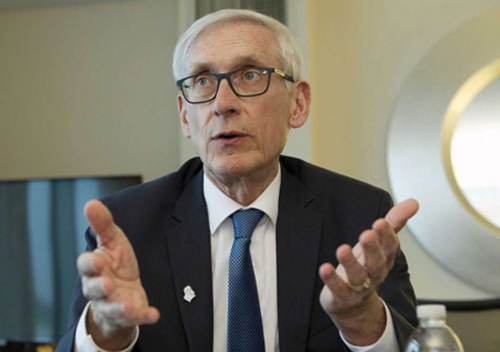MADISON, Wis. (AP) — Republican legislators criticized Democratic Gov. Tony Evers’ state budget Wednesday as “irresponsible” as they began their first day of public deliberations on revisions to the spending plan.
The GOP-controlled Joint Finance Committee began the weeks-long revision process with briefings by officials from the departments of Public Instruction, Transportation and Health Services. The committee didn’t take any votes, treating the briefings instead as an opening for Republicans to spend hours criticizing the budget in front of the media.
The briefings began with the panel’s Republican co-chairs, Rep. John Nygren and Sen. Alberta Darling, railing against the budget before the first agency official sat down in front the microphones. Nygren blasted the budget as “irresponsible.” Darling questioned how Evers could raise taxes by $1.3 billion and pointed out the Legislative Fiscal Bureau projects that spending commitments laid out in the budget would lead to a nearly $2 billion shortfall heading into the 2021-23 budget.
That triggered a mini-quarrel with Democratic Rep. Chris Taylor and Sen. Jon Erpenbach. They said the budget addresses priorities that Republicans ignored for eight years under former Republican Gov. Scott Walker, including education and road repairs. “All we’ve heard from the day this was introduced from Republicans is ‘Oh, my God, the sky is falling.’ Well, it’s not,” Erpenbach said. Nygren cut off debate and then launched into the K-12 portion of the budget. Evers has proposed spending an additional $1.4 billion on schools, including $606 million more for special education. He also has called for capping enrollment in the state’s voucher school program, which using public funds to subsidize private school tuition. Democrats oppose the subsidies, saying they pull money away from public schools.
Nygren minimized the additional special education money as a cost-shift. He argued that the money would simply replace dollars that schools are currently pulling from their operational budgets for special education and wouldn’t go toward expanding programs. He also attacked the plan to cap voucher participation, contending that the program offers options for students struggling in public schools.
DPI Superintendent Carolyn Stanford Taylor responded that the state hasn’t devoted enough money to special education and called the voucher cap “a pause” while Evers decides how best to sustain subsidies. Republicans spent three hours questioning the superintendent and her aides. They then called DOT Secretary Craig Thompson forward and began to grill him about Evers’ roads budget. The governor has called for raising the 32.9-cent per gallon gasoline tax by 8 cents and eliminating the state’s minimum mark-up on fuel. Evers has said the net result could be a 14-cent decrease in the per-gallon cost. He also would spend an additional $320 million on highway repairs and expansion, and give driver’s licenses to people in the country illegally. Republicans questioned Thompson about whether eliminating the minimum mark-up would really reduce gas prices by 14 cents, whether there’s enough contractors to perform all the work and the cost of allowing people in the country illegally to obtain licenses.
Thompson said he wasn’t sure whether eliminating the minimum mark-up would generate 14 cents in savings, but he said it would have a “significant” downward impact on prices. He predicted that more projects would draw more contractors to complete the work. He didn’t have any estimates on the cost of giving people in the country illegally driver’s licenses, but promised that the DOT could absorb it.
The committee ended the day by grilling DHS Secretary Andrea Palm about Evers’ plan to accept an infusion of federal funding for a Medicaid expansion. The move would add about 82,000 people to the rolls and save the state about $320 million over the next two years. Republican Assembly Speaker Robin Vos has said there’s “no way” Medicaid will expand.
Nygren argued that half of the 82,000 potential new enrollees already have private insurance and said he’s worried about the impact of taking 40,000 people out of the private marketplace.
Palm countered that many of the potential enrollees are moving between private insurance and Medicaid as work circumstances change, creating instability.





